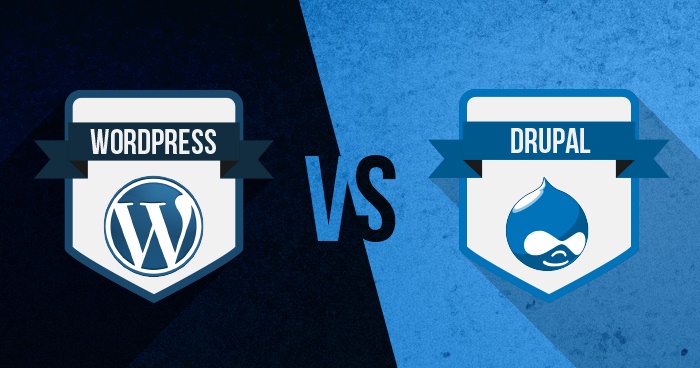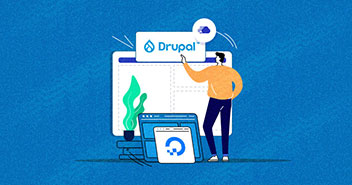
Ah, here we are. Back to the CMS battle. And what better candidates to pick for this battle than Drupal and WordPress. Both are immensely powerful with different strengths. On the surface, both may look the same. However, if you dig deeper, you’ll start to notice that they lie at the opposing sides of the user preference spectrum.
In this article, I will take a look at the differences as well as the future of these two CMS. Let’s start.
SEO
It’s no coincidence that the first topic I’ve picked for the battle between these two is SEO. Search engine optimization is probably the wheels that make the internet run. With the omnipresent search engines being the most important websites on the internet right now, it’s vital that your website ranks higher up in SERP. This is an essential element of improving website’s reach and visibility.
Note that I won’t go into the details of modules and plugins and will only highlight the bare basics of both the CMS.
Drupal
Right out-of-the-box, there can be no doubt that Drupal is much more SEO friendly than WordPress. For example, it supports native caching which enables it to be very fast, an important consideration for high SERP position. By adding modules to the mix, this advantage is further enhanced, taking Drupal further up the SEO ladder.
WordPress
Out-of-the box, there aren’t any native WordPress SEO functionalities. However, you’re not exactly doomed in the SERP competition. Some excellent modules such as YOAST SEO plugins can make your WordPress website a lot more SEO friendly.
Performance
Drupal
This is yet another feature where Drupal takes the lead. As I pointed out in the last section, native caching capability makes Drupal websites faster. Not only this but since Drupal allows you to tinker with the core, a good programmer can wring out a lot more of performance boost from your Drupal website. It is also worth noting that Drupal mainly caters to the enterprise market, and as such, it is well suited to handle websites with a large volume of data and thousands of pages. A well managed Drupal website rarely goes down and slow downs are rare events.
WordPress
Even though WordPress falls behind Drupal in this department, it still isn’t any slouch. Although the point to be noted here is that you will have been on top of your WordPress website’s management to ensure it stays optimized and no theme or plugin slows down the speed.
Ease of Use
Drupal
Ease-of-use is one area where Drupal is often placed second to WordPress. However, there is a pretty good reason for this: Drupal has focused on experienced enterprise level users rather than lay users. The learning curve is much steeper than WordPress. It is to be noted, however, that Drupal has slowly been adding features that enable it to be more user-friendly. Things like an easier setup of modules, themes, and content are paving the way towards a more user-friendly Drupal.
WordPress
One of the main reasons for WordPress’ immense popularity in the realm of CMS hosting is its ease of use and the overall structure designed for average users. On the surface, WordPress is a lot more user-friendly and a lot less complex than Drupal. However, everything that sparkles isn’t a diamond, and the user-friendliness of WordPress comes at the cost of customization issues. Since WordPress’ main aim is to cater to individuals and newbies, several areas of the WordPress core are locked. For experienced developers, this is a major obstacle in customizing the core platform to the project’s requirements.
Nothing as Easy as Deploying PHP Apps on Cloud
With Cloudways, you can have your PHP apps up and running on managed cloud servers in just a few minutes.
Updates and Upgrades
Drupal
Drupal always have problems in this area simply because it doesn’t support automatic updates of the database. This means that every major update adds significant changes to the codebase of the CMS without doing much for the database. Furthermore, you can set your eyes on CMS hosting and avoid the hosting hassles. The biggest example of this being Drupal 8, that was such a massive change that many Drupal loyalists opted to leave the ecosystem altogether. However, ever since, Drupal has been slowly but surely making its update and upgrade system better and merging the update and upgrade paths. This way, the minor updates of version 8 will be automatically upgraded when the new version 9 rolls out.
WordPress
WordPress has a great update and upgrade systems that ensure that all new major and minor versions are seamlessly integrated with the existing core. The changes to the code and the database happen in the background and all the user sees is a notification when the new changes have been integrated successfully (or unsuccessfully!).
Security
Drupal
It’s time for Drupal to take the lead back from WordPress in this last section. When it comes to security, Drupal is the king! This is why Drupal powers a significant number of government websites throughout the world. Security is the reason why high-profile websites such as The White House and The Economist prefer Drupal. The cherry on top of the cake is that Drupal is very secure right out of the box, so you do not have to waste hundreds of man-hours on beefing up the security measures.
WordPress
WordPress lags behind Drupal in the security department by quite a margin. A simple Google search for “WordPress attacks” or “WordPress vulnerabilities” turns up a lot of incidents of WordPress websites being compromised. This is mainly due to the huge library of plugins and themes, were bad code goes unnoticed until a security breach occurs.
Verdict
So, what are the takeaways from this comparison?
Well, Drupal is leading WordPress in most of the major departments, with the ease of use being the only major point going for WordPress.
I’d say that with so many new features being added to Drupal, and with the feedback from the community being taken into consideration, Drupal only needs to work on making its learning curve shallower in order to be more accessible to newbies. If it can do that, it won’t be long before Drupal becomes the choice of CMS for non-technical people in addition to the technical ones, see Why Drupal Should Power Your Next Web Project.
What do you think? Agree? Disagree? Think nothing can overtake WordPress? Sound off in the comments section below!
Shahzeb Ahmed
Shahzeb is a Digital Marketer with a Software Engineering background, works as a Community Manager — PHP Community at Cloudways. He is growth ambitious and aims to learn & share information about PHP & Laravel Development through practice and experimentation. He loves to travel and explore new ideas whenever he finds time. Get in touch with him at [email protected]

